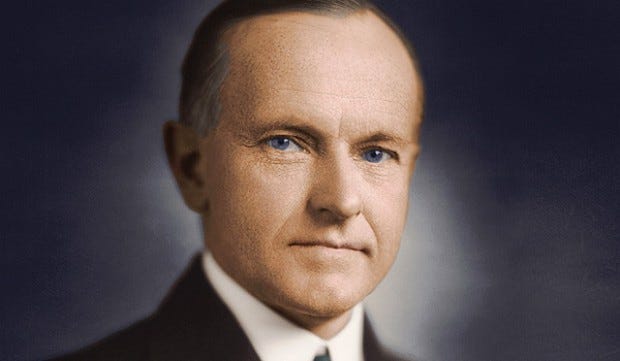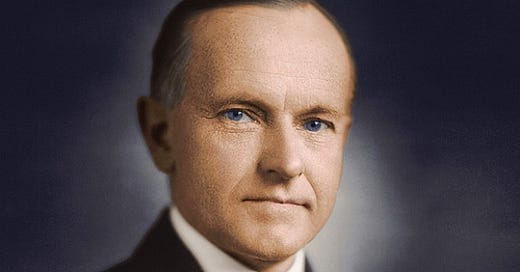Calvin Coolidge - Civil Rights Pioneer
UPDATE - Even more on the civil rights history of President Coolidge - LINK.

Kurt L Schmoke: Judging from some of the commentary in the news media, many people seemed surprised by the fact that Republican Sen. Rand Paul would visit Howard University, a university with a majority African-American student population. The main thrust of Paul’s speech last month was to try to persuade the African-American community that its interests were best served by the Republican party rather than the Democratic party, and that the GOP was still the party of Abraham Lincoln, the party that produced black congressmen after the Civil War and the first black United States senator in the 20th century. The audience at Howard was polite but skeptical. Paul’s case may have been strengthened had he made reference not to the 16th president of the United States, but to the 30th president.
The 30th president, Republican Calvin Coolidge, was a major supporter of Howard University and an overlooked figure in advancing the cause of racial equality in the United States. In one of his earliest acts as president, Coolidge proposed and persuaded Congress to pass an appropriation bill that reinforced the unique relationship between Howard and the federal government.
In his First Annual Address to Congress in 1923 he wrote: “About half a million dollars is recommended for medical courses at Howard University to help contribute to the education of 500 colored doctors needed each year.” This appropriation was to grow over the years, leading to the production of health care and other professionals who would stimulate the growth of an African-American middle class and develop leaders in all walks of life, nationally and internationally. Coolidge made it clear that his interest in Howard specifically and the African-American community generally was not limited to this one gesture. Historians of the civil rights movement of the often note the significance of a speech made at Howard in 1964 by President Lyndon Johnson in which he uttered the words, “We shall overcome.” This was seen as a dramatic gesture at that time for a politician from the Southwest to echo the words of an anthem of the civil rights movement. But forty years before Johnson’s declaration, Coolidge gave the commencement address at Howard and signaled a significant change in progressive race relations. In reading his words it must be recalled that he spoke at a time when separate but equal was the law of the land, when lynchings trumped due process in criminal cases involving black men, and when the most recent Democratic president, Woodrow Wilson, had praised a film which glorified the Ku Klux Klan. Coolidge began his address by referencing the sad history of slavery and the importance of religious leaders in ending that period of American history. Because of his great interest in supporting business, he then described the growth of businesses owned by African-Americans since emancipation from slavery. He emphasized business growth and the spread of literacy among blacks as paralleling developments in the nation at large. To the Howard graduates and to the entire country he then said: “The nation has need of all that can be contributed to it through the best efforts of all its citizens. The colored people have repeatedly proved their devotion to the high ideals of our country. They gave their services in the war with the same patriotism and readiness that other citizens did …. The propaganda of prejudice and hatred which sought to keep the colored men from supporting the national cause completely failed. The black man showed himself the same kind of citizen, moved by the same kind of patriotism, as the white man. They were tempted, but not one betrayed his country…They came home with many decorations and their conduct repeatedly won high commendation from both American and European commanders.” Read more: http://www.politico.com/story/2013/05/calvin-coolidge-civil-rights-pioneer-91065_Page2.html#ixzz2TW6KTsJX



